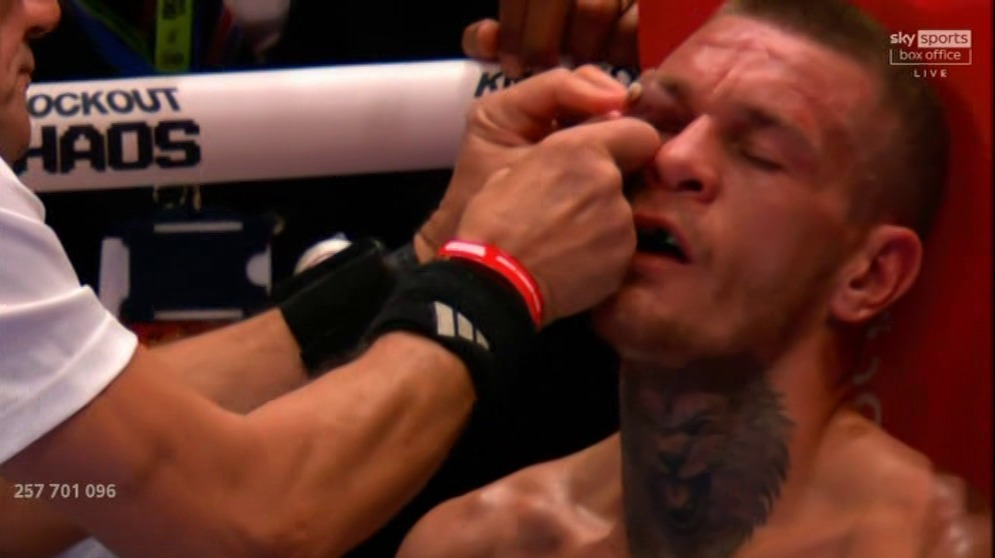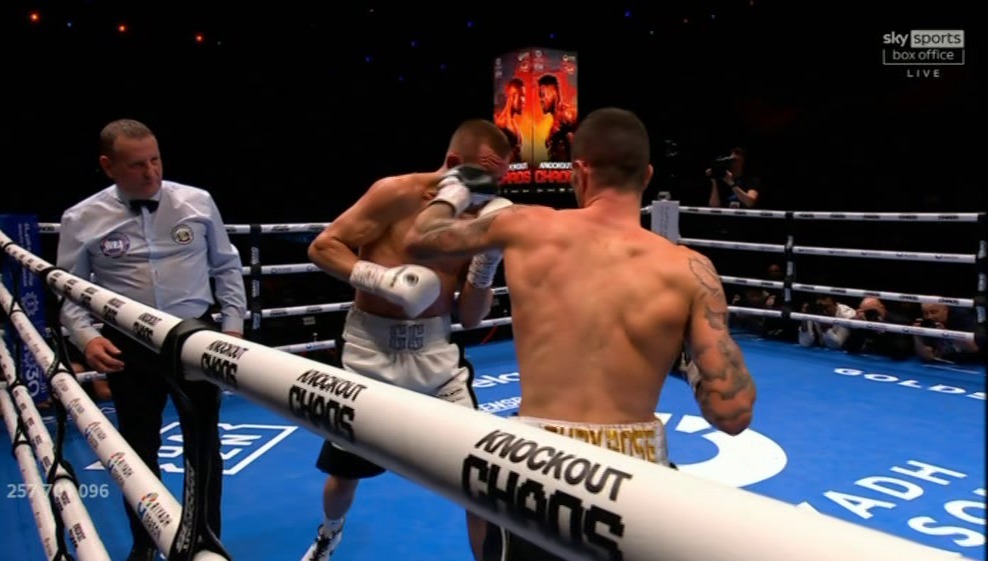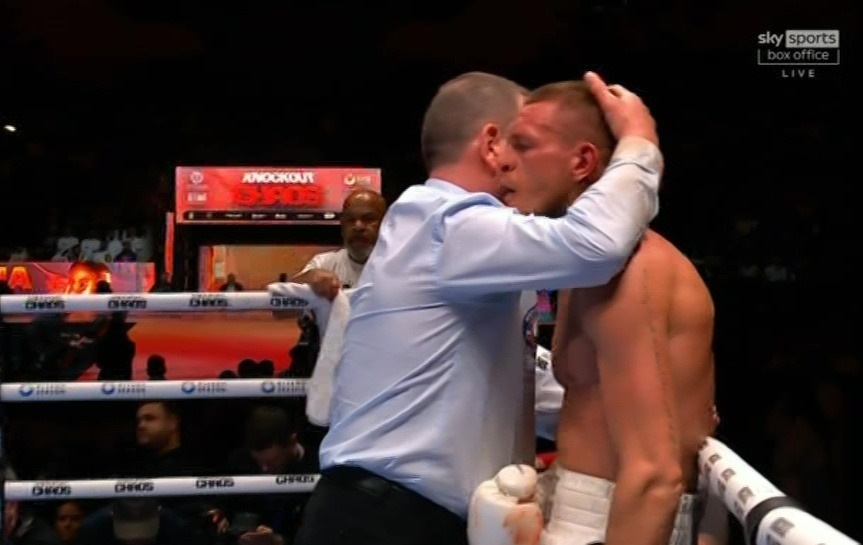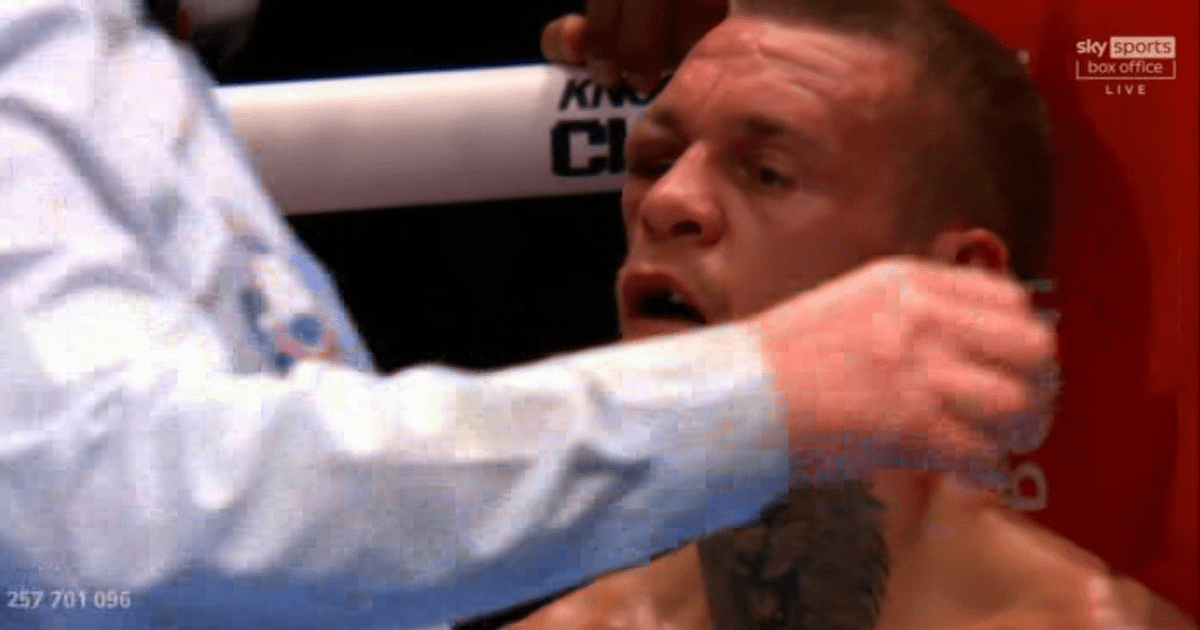Mark Chamberlain secures victory as Gavin Gwynne suffers gruesome eye injury
Mark Chamberlain's victory in the lightweight bout against Gavin Gwynne took a dark turn as the Welsh boxer sustained a severe eye injury early in the fight.
The 25-year-old Chamberlain, hailing from Portsmouth, landed a devastating punch in the very first moments of the match in Saudi Arabia, causing significant damage to Gwynne's eye, which ultimately led to his defeat.
Gavin Gwynne suffered a nasty-looking eye injury
 His cutman did his best to reduce the swelling
His cutman did his best to reduce the swelling
 Gwynne suffered the injury in the first round
Gwynne suffered the injury in the first round
 His team threw in the towel at the end of the fourth round
His team threw in the towel at the end of the fourth round
Despite several assessments on Gwynne's injured eye, it became evident that he could not continue, and the fight was stopped in the fifth round for his own safety.
Gwynne's inability to defend himself became apparent early in the match, with Chamberlain's strategic and powerful punches causing significant damage.

Referee Howard Foster closely monitored Gwynne's condition, giving him multiple opportunities to recover, but it was clear that the Welshman was at a severe disadvantage.
Ultimately, with Gwynne taking excessive punishment and his team recognizing the severity of the situation, they made the decision to throw in the towel in the fifth round.
Despite a slight delay in stopping the fight, Chamberlain's relentless attacks were finally halted, ensuring Gwynne's safety and well-being.
Frequently Asked Questions
How do boxers control their weight and maintain their weight classes?
Boxers control their weight through a strict diet and a precise training regime. Nutritionists help them develop a plan to reach their target weight without compromising nutrition or energy. It is important to maintain a regular exercise routine and check your weight regularly, especially as you approach a fight. Weight management, when done wrong, can lead health issues and poor performance.
What is required to begin training in professional boxing?
To begin training for professional boxing, one must possess a strong commitment to physical fitness, discipline, and a willingness to learn. The first step in training is to learn the basics, such as footwork, stance, punches and defensive techniques. Joining a boxing gym that has experienced trainers with a thorough understanding of the nuances involved in professional competition is essential. Beginner boxers are usually subjected to a strict regimen of technique drills, conditioning and sparring before they consider competing.
How long will it take me to become a boxer professional?
The time to become professional boxer can differ greatly. It is dependent on the starting level of the boxer, his/her ability to adapt, and how well he/she trained. It can take a number of years to develop the necessary skills and gain enough amateur experience. Some people may develop more quickly while others will take more time.
What are some of the risks involved in professional boxing?
Like any contact sport, professional boxing is not without its risks. They include acute injuries, such as cuts and bruises, broken bone, head trauma, and potential chronic conditions caused by repeated impacts, such concussion syndromes, or neurological disorders. Proper training, safety equipment, and adherence to boxing regulations help mitigate risks, but they can never be fully eliminated. Accepting and understanding these risks are essential to choosing to box professionally.
How important is physical training in professional boxing?
Boxing is a sport that requires physical fitness. The sport demands that athletes have high levels in strength, speed, stamina, and agility. Professional boxers must engage in a tailored fitness program that includes aerobic and anaerobic exercises, strength and resistance training, and flexibility workouts. A boxer cannot train efficiently and perform well in the ring without superior physical fitness.
What age can you learn to box professionally?
There are age restrictions in professional boxing. Most boxing commissions require that boxers be 18 years or older to compete professionally. While there isn’t a specific upper age limit, health and physical factors will limit how old you can compete safely and effectively. Prior to taking up professional sports, it’s important for older athletes be evaluated thoroughly for fitness and safety.
What is required for a professional boxer to begin?
For anyone starting in professional boxing, the essential equipment includes boxing gloves, hand wraps, a mouthguard, headgear (for sparring), and proper footwear. Technical workouts require a heavy bag or speed bag as well as a double-end, double-end, or other training aids. Quality equipment is important for safety and durability. Subpar gear increases the risk of injury.
Statistics
- A study showed that most professional boxers have spent more than 4 years in training before their first professional bout.
- Nutrition experts emphasize that over 70% of a boxer’s diet should focus on carbohydrates and proteins for energy and recovery.
- Professional boxers typically train 4 to 6 hours per day, 5 to 6 days a week, depending on their fight schedule.
- Reports suggest that successful professional boxers can earn upwards of 50 times more than the median purse for entry-level professionals per fight.
- Research shows that a boxer’s reaction time is typically under 0.25 seconds, honed through repetitive drills and sparring.
- On average, a professional boxer spars between 100 to 200 rounds in preparation for a major fight.
- Statistical data indicates that there has been a 15% increase in the number of professional boxing gyms over the last decade.
External Links
usaboxing.org
wbcboxing.com
ibhof.com
teamusa.org
ringtv.com
proboxing-fans.com
titleboxing.com
How To
How to mentally prepare for a boxing match
Mental toughness is essential to preparing for a match of boxing. Visualize yourself succeeding on the ring. Establish a pre-fight ritual that calms and focuses your mind. Mentally rehearsing your strategy and tactic can reinforce your gameplan. Keep a positive attitude, confident but realistic. Meditation and breathing exercise can help to manage stress and anxiety in the run-up to the fight.

